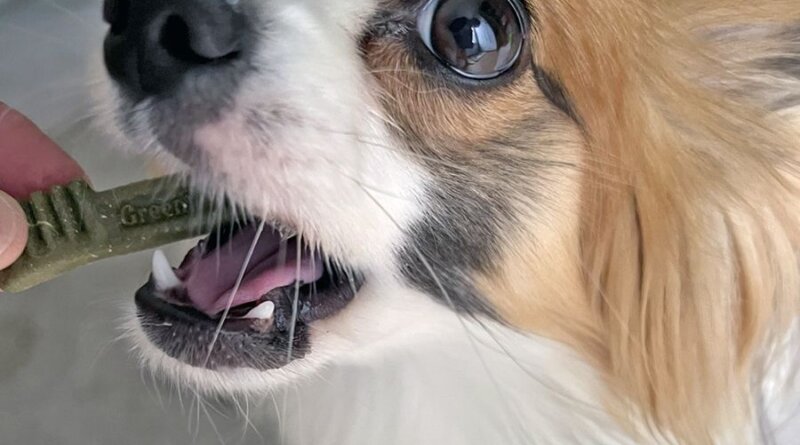Dental Chews for Dogs: Worth the Hype
Disclaimer: If you purchase items through links on our site we may earn a commission.
Dental chews really do help keep your dog’s teeth looking their best, so they are worth adding to your dog’s dental health care routine.
Scientific studies show that giving your dog a dental chew every day can help:
- Decrease plaque and calculus (tartar) buildup
- Decrease gingivitis
- Improve bad breath
But what dental chew should you pick out? A great place to start your search is the Veterinary Oral Health Council (vohc.org). Products that receive the VOHC seal have been shown in studies to help improve dental health.
Greenies Dental Treats and Dr. Lyon’s Grain-Free Dental Treats were also both included in a series of studies published in the Journal of Animal Science and helped the dogs have better teeth.
If your dog has any food sensitivities or allergies, check the ingredients before purchasing a product. For picky dogs, try a couple different chews to see what your pup likes.
How Dental Chews Work

You may be surprised that dental chews are often NOT the longest-lasting dog chews. Their dense texture is formulated to maximize the chew’s contact with your dog’s teeth. As the chew scrapes over the teeth, it removes plaque and calculus.
There is a downside to these chews, however: They are high in calories. If your dog battles a weight issue, discuss the use of chews with your veterinarian before starting them. For example, if you have a 10-lb. dog, his daily calorie allowance is around 248 (depending upon activity, current weight, and so on), according to the Association for Pet Obesity Prevention. A small (teenie) Greenie dental chew is 28 calories, almost 10% of your dog’s daily allowance.
How to Clean Dog Teeth
For optimal dental health, tackle the problem from multiple angles.
- Start working on brushing your dog’s teeth every day, if you can, with an enzymatic toothpaste, like Virbac CET Enzymatic Toothpaste, or the VOHC-recommended toothpaste Petsmile, Whole Dog Journal’s No. 1 choice. Start by letting your dog lick the toothpaste off the brush, then gradually build up to brushing the entire mouth. This may take several weeks to months depending on your dog’s personality, but it is worth the effort.
- Feed a dental chew that has scientific evidence of efficacy each day.
- Have dental cleanings done under anesthesia as recommended by your veterinarian.
A note of caution: Never use human toothpastes that are designed to be used and then spit out. Your dog will swallow the product, and nearly all human toothpastes include ingredients that can be harmful or deadly to your dog.





